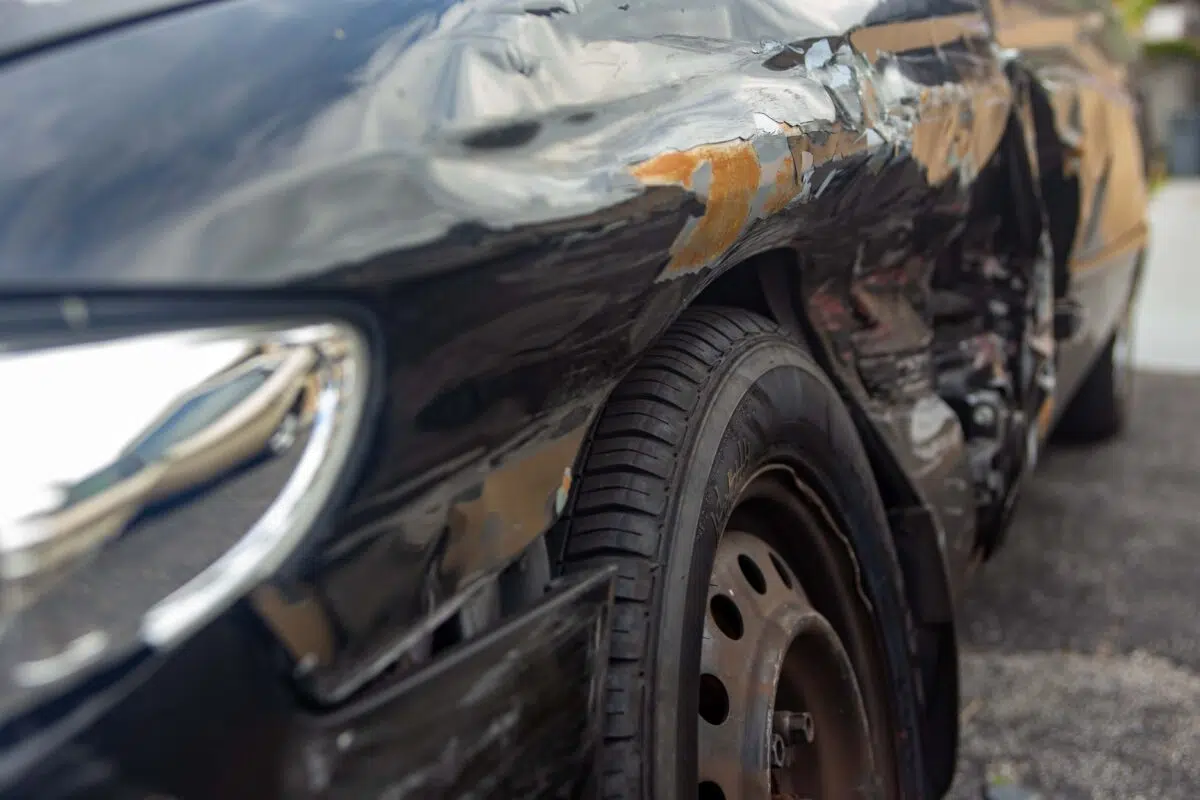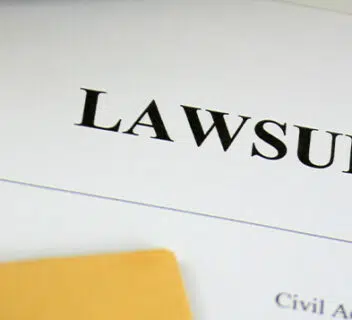A sideswipe accident involves the sides of two vehicles colliding, often leading to disputes over who is to blame. If you’ve been in a sideswipe accident, knowing how to determine fault, recognizing common causes, and taking immediate steps are crucial. This article will guide you through these aspects and more.
Key Takeaways
- Sideswipe accidents are often caused by distracted driving, unsafe lane changes, and failing to check blind spots, leading to significant vehicle damage and injuries.
- Determining fault in sideswipe accidents involves documenting evidence such as vehicle damage, eyewitness accounts, and police reports, with the driver who fails to maintain their lane generally deemed at fault.
- After a sideswipe collision, it is crucial to call emergency services, document the scene, collect contact details from involved parties, and understand your legal rights for potential compensation claims.
Understanding Sideswipe Accidents
Sideswipe accidents occur as a type of collision where the sides of two vehicles come into contact. These incidents can range from minor fender-benders to severe collisions, often resulting in significant vehicle damage and serious injuries. A sideswipe collision typically happens when one vehicle’s side hits or scrapes another, whether both vehicles are moving or one is stationary.
Common scenarios for sideswipe car accidents include unsafe lane changes and vehicles moving parallel on multi-lane highways. Drivers often fail to check their blind spots or misjudge the distance of other vehicles, leading to these accidents. The unpredictable nature of sideswipe accidents often catches drivers off guard, leaving little time to react.
Sideswipe accidents can have serious consequences, resulting in property damage and injuries that range from minor to fatal. Distracted driving is a major contributor, as sideswipe accidents happen when drivers may not notice they are drifting out of their lane until it’s too late.
Common Causes of Sideswipe Collisions
Distracted driving, such as texting, talking on the phone, or interacting with in-car systems, significantly increases the risk of drifting into another lane in the same direction, making it a leading cause of sideswipe accidents and reckless driving, where drivers may lose control due to drowsy driving.
Another common cause is failing to check the blind spot before changing lanes. Failing to check blind spots often results in one vehicle sideswiping another. Aggressive driving behaviors, such as speeding and making abrupt lane changes, also elevate the chances of sideswipe collisions and road rage.
Impaired driving due to alcohol or drugs can lead to drivers losing control, veering in the opposite direction into adjacent lanes, and causing sideswipe accidents. These behaviors endanger not only other drivers but also other road users, highlighting the need to understand and avoid the causes of sideswipe collisions.
Typical Injuries in Sideswipe Car Accidents
Sideswipe accidents can cause a range of injuries, varying greatly in severity and impact, including:
- Whiplash and traumatic brain injuries
- Bone fractures
- Injuries affecting the neck, back, and head, ranging from minor to severe
- Facial trauma, often caused by the impact of the collision
- Internal organ injuries, which can lead to significant medical complications and require extensive treatment
For more information about personal injury and car accident legal resources, click here.
Fractures are common injuries, especially in high-speed collisions, as are soft tissue injuries like sprains and strains. Injuries from sideswipe accidents have suffered injuries that can lead to substantial medical expenses and long-term recovery efforts.
The statistics are sobering: approximately 27,000 injuries and 2,500 fatalities occur annually from most sideswipe accidents. These statistics underscore the need to understand and prevent sideswipe collisions to protect all road users and enhance highway safety.
Determining Fault in a Sideswipe Accident
Determining fault in a sideswipe accident can be complex. Documenting vehicle damage is essential, as specific patterns, such as skid marks, can indicate how the collision occurred. Scrape marks and dents on the vehicles can reveal the path of the impact and aid in the analysis.
Eyewitness accounts are crucial, providing valuable information about the sequence of events and confirming the other driver’s negligence. Their testimonies can clarify which driver acted negligently, helping resolve conflicting accounts.
Accident reconstruction professionals often analyze evidence, reconstruct sequences, and provide expert testimony to establish liability. Debris around the accident site, video footage, and police reports all contribute to a thorough evaluation.
In a sideswipe accident, the driver who does not keep their own lane is usually considered an at-fault driver in the same lane. This is a common determination in such incidents. This determination is vital for insurance claims and potential legal action, necessitating the gathering of all necessary evidence.
Steps to Take After a Sideswipe Collision
After a sideswipe collision, remain calm and take steps to protect yourself and your ability to claim compensation. Call emergency services to report the accident and seek medical attention if needed. Document the scene thoroughly to support your case.
Finally, obtain contact information from all involved parties and witnesses. Just be careful not to have extensive discussions with insurers until you’ve first spoken to a qualified attorney! Sensitive disclosures you make during those discussions could result in the undermining of your claims later.
Call Emergency Services
Calling emergency services after a sideswipe accident is crucial for multiple reasons. Obtaining a police report that details the collision can help determine fault and provide an official record of the incident. If injuries are apparent, immediately request medical assistance to prioritize health and ensure that medical records are accurately documented.
Police reports typically include details from all parties involved, eyewitness accounts, and an officer’s opinion of fault, which can be invaluable for your case.
Document the Accident Scene
Documenting the scene of a sideswipe accident is essential for establishing the facts later on. Take photos and videos of the accident scene, the vehicles involved, and any visible damage. This documentation can be crucial for your insurance claim and any legal action that may follow.
Ensure that you capture images of all vehicles involved and any visible damage at the scene.
Obtain Contact Information
Collecting contact information from all parties involved in a sideswipe accident is crucial for insurance claims and potential legal action. Obtain names, phone numbers, and addresses of all parties and witnesses for future reference.
Eyewitness accounts can provide key evidence in determining fault, making it essential to gather their contact information to prove fault.
Legal Implications and Compensation Entitlement
After a sideswipe accident, understanding the legal implications and your compensation entitlement is crucial. Lawyers help calculate the full extent of damages, covering both economic and non-economic losses. Timely filing of personal injury claims is critical, as delays can jeopardize your right to compensation.
Compensation entitlement depends on a personal injury claim for claimable losses, including lost wages, medical expenses, and fair compensation you deserve for pain and suffering. Potential defendants in a personal injury lawsuit for a sideswipe accident may include the other driver, employers, auto manufacturers, and property owners.
In contributory fault states, plaintiffs cannot sue and recover damages if they are at-fault in the slightest (i.e., one percent at-fault even).In modified comparative fault states, plaintiffs can sue and recover damages if they are 50 percent at-fault (or less). In pure comparative fault states, plaintiffs can sue and recover damages even if they are 99 percent at-fault.
How a Sideswipe Accident Lawyer Can Help
Hiring a sideswipe accident lawyer can make a significant difference in the outcome of your case. Personal injury attorneys assist by:
- Proving liability for sideswipe accidents, ensuring that you have the evidence needed to support your claim.
- Communicating with insurance companies on your behalf.
- Protecting your rights and interests.
Most personal injury lawyers work on a contingency fee basis, which means they only get paid if you win your case. Contact 1-800-THE-LAW2 for a free consultation regarding sideswipe car accident cases with a car accident lawyer in our network.
Having a legal expert on your side allows you to focus on recovery while they handle the complexities of your case.
Summary
In conclusion, sideswipe accidents are a common but often overlooked type of car accident with potentially severe consequences. Understanding the causes, typical injuries, and steps to take after an accident can significantly impact your ability to claim compensation and recover from the incident.
Remember, legal assistance is invaluable in navigating the aftermath of a sideswipe collision. By consulting a qualified accident attorney, you can ensure that your rights are protected and that you receive the compensation you deserve.
Frequently Asked Questions
After a sideswipe accident, it’s essential to call emergency services, document the scene, and gather contact information from everyone involved. Taking these steps ensures proper handling of the situation and protects your interests.
Fault in a sideswipe accident is established by examining vehicle damage, gathering eyewitness testimony, and utilizing expert analysis. This comprehensive approach ensures an accurate assessment of the incident.
Sideswipe accidents can result in injuries such as whiplash, traumatic brain injuries, fractures, and internal organ injuries. It’s essential to be aware of these potential risks for better safety on the road.
You can claim compensation even if you’re partially at fault, depending on your state’s laws—pure comparative fault allows recovery regardless of your degree of fault, while modified comparative fault typically limits recovery if you are more than 50 percent at fault. In a small minority of states, you can’t recover if you’re even one percent at-fault. Given the diversity of rules and outcomes, it’s crucial to understand the specific rules in your state.
Hiring a sideswipe accident lawyer is essential for effectively proving liability, negotiating with insurance companies, and securing fair compensation for your damages. Their expertise will significantly enhance your chances of a favorable outcome.



















